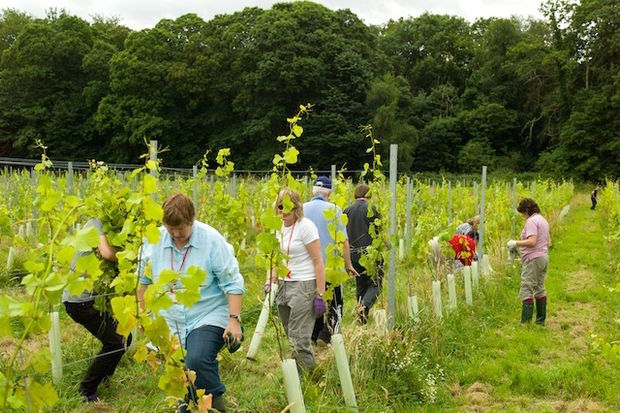
Davenport hails London's first sparkling wine
Forty Hall in Enfield has produced what is believed to be London's first sparkling wine.
The 10-acre organic vineyard is social enterprise providing health and well-being benefits to local people.
It is the first commercial-scale vineyard in London since the Middle Ages.
Will Davenport of the award-winning Davenport Winery in Sussex was brought in as a consultant before the first vines were planted and advised Forty Hall on organic viticulture.
He subsequently has been involved directly in the production of the wine.
The Forty Hall grapes were delivered to the Davenport Winery where they were pressed and bottled.
Davenport said: "The 2013 sparkling wine was their first production of Chardonnay, Pinot Noir and Pinot Meunier, so as a new wine there was some excitement about seeing what their style would become over the fermentation and following maturation in bottle.
"As a first production from young vines the volumes are not huge, but Forty Hall is in a good position to increase volumes in future years. The 2013 vintage shows the early signs of the quality that can be achieved from their site.
"The wine shows a fresh zesty lemon aroma and full mouth feel with great structure and substance. I expect it will continue to improve in the bottle. As a debut vintage I am especially pleased with this wine."

|
Forty Hall Sparkling Brut |
The first release of FHV London Sparkling Brut has been limited to those who signed up to the initial sponsorship offer, which closed at the end of September.
A second limited release of the 2014 vintage is expected next year, and will again be exclusive to sponsors.
To sponsor the next release, please click here.
Sponsorship includes a guided tour of the vineyard and the opportunity to take part in the autumn 2016 harvest.
The 2015 harvest offered high yields, and FHV London Sparkling Brut 2015 is expected to go on public sale in 2017.
Forty Hall also makes still wines from the Ortega and Bacchus varietals. These will be available to the public from the farm's shop in 2016.
Forty Hall is planning to adopt a biodynamic theory of viticulture. Biodynamics uses organic farming principles alongside homeopathy and attention to the lunar cycles.
London once had numerous vineyards, including at Westminster, St Giles and in the Tower of London.




